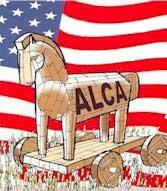The acronym FTAA stands for Free Trade Area of the Americas, a trade agreement that the United States (founder) intends to implement. Based on this agreement, the countries of the American continent, except Cuba, would integrate this bloc, and gradually, customs fees would be withdrawn for commercial transactions between their members.
The implantation of this economic bloc would serve, primarily, North American interests, considering that the deficit in the balance of trade of the United States is a reality. Thus, the implementation of the FTAA would promote a significant increase in exports from that country. In the future, Brazilians could purchase goods and services from US companies without additions arising from taxes, as well as our companies would also enter the market North American. However, it is clear that competition is unequal, as the world power's productive sectors are far ahead of our companies. This is explained by the fact that the US economy is at least twelve times larger than ours. If we consider the reality of other countries on the continent, this difference may be even greater.

At the meeting held in 2001, potential FTAA members expected its inauguration by December 2005. Brazil was against the speed of implementation, not least because this is a decision of great importance for the future of the country. Many scholars claim that this supposed economic bloc is viable for rich countries like Canada and the United States.
In reality, the socioeconomic disparity between these two important nations and the rest of the countries in the Americas makes the FTAA effective. Strengthened economies will always stand out over less developed ones.
By Eduardo de Freitas
Graduated in Geography
Brazil School Team
Economic blocks - geography - Brazil School
Source: Brazil School - https://brasilescola.uol.com.br/geografia/fracasso-da-alca.htm


